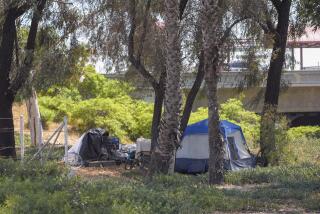Don’t Let Possessions Define You
As I batten down the sunroof and hang up the phone, preparing to drive from the South Bay to South Pasadena, a man with a sign stands at the freeway on-ramp.
While I wait for the meter light to turn green, we make eye contact. I smile, tightly. “Will work for food,” I read, and then hit the gas.
“There, but for the grace of God, go I,” I think. As I pull onto the freeway, I look at my car and sadly see there’s more luxury here than that man has in his whole life. And, like a lot of us, no matter how much or how often I try to cut back, I end up with too much. It’s a recurring sickness, this consumption fever.
The first time was after college when I had acquired the props I thought necessary: the fancy apartment and car, the clothes, the job. The apartment was near the job so I could drive there in the car wearing the clothes. What did I have? Well, I had a job.
To cleanse myself, I became inspired by the Kwakiutl Indians’ philosophy. “Don’t let possessions define you,” they said.
I traded the Porsche for an old Volkswagen “Bug,” quit the job, used my savings to start graduate school, and moved to Echo Park.
Some poor people there had no homes, but they were not referred to as homeless then. The bag people we used to call them, with their carts filled high. Many lived in alcoves of Elysian Park next to Dodger Stadium. I used to tromp through fields to leave food. That was 1978.
Today, it’s all different. Today, I read stories about the “hidden homeless,” well-to-do women whose husbands have been laid off or have deserted them. They sleep in their luxury cars and cruise upscale malls by day.
In juxtaposition are the openly homeless in Santa Monica--yet even that agreement is breaking down. So many homeless people have flocked there that residents with houses want the residents with boxes to move on--anywhere.
It can be just a few moves away in the game of life, that any one of us could end up on the street with a sign in our hands. How does it happen?
I once knew a psychiatrist who, as well as maintaining a private practice, directed the psychiatric residency program at a prestigious medical school. He had offices in his suburban mansion, and its lavishness and the downtown hospital’s starkness seemed surreal reflections of society’s economic extremes.
To meet with him, I had to weave my way through the hospital’s day room, where the people who’d lost their money and their minds spent their days in dirty bathrobes, staring at a black-and-white television, sitting on ripped plastic chairs, chain smoking.
Often, I’d ask the famous doctor, “How did this happen to them?”
A typical psychotherapist, he responded, “What do you think?”
Doctor, I didn’t know then, and I don’t know much more now.
Ross Perot graphically asserted he’d “cut grass” if he lost his fortune. I’d clean toilets if that’s what it took. I’ve done it before--and, although no one can predict what would happen if a hypothetical question turned real, I’d clean houses again. Or so I like to think.
More to Read
Sign up for Essential California
The most important California stories and recommendations in your inbox every morning.
You may occasionally receive promotional content from the Los Angeles Times.






